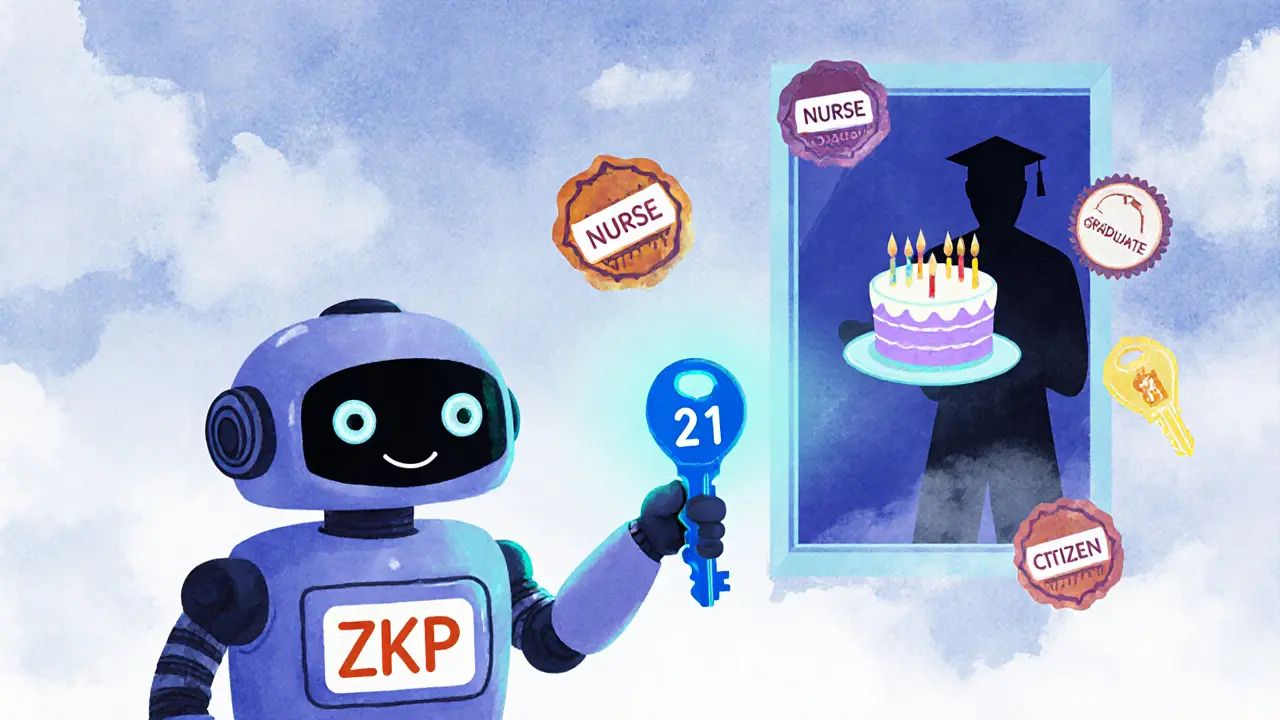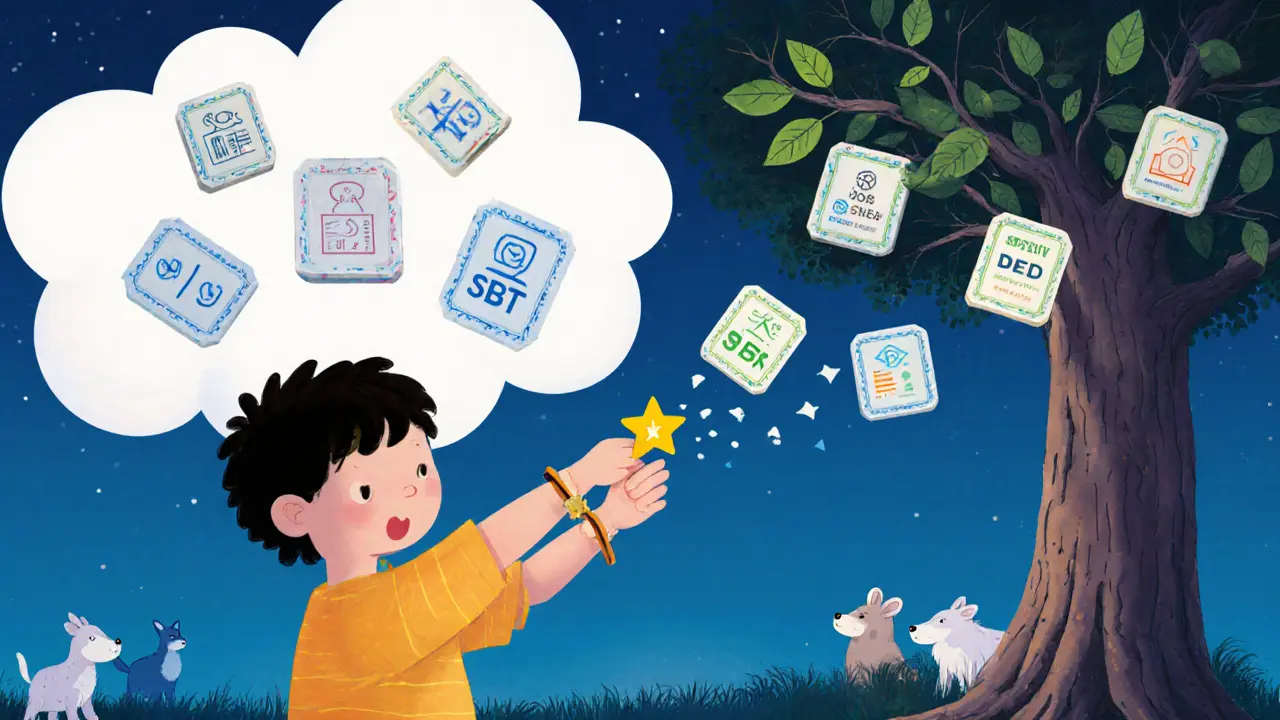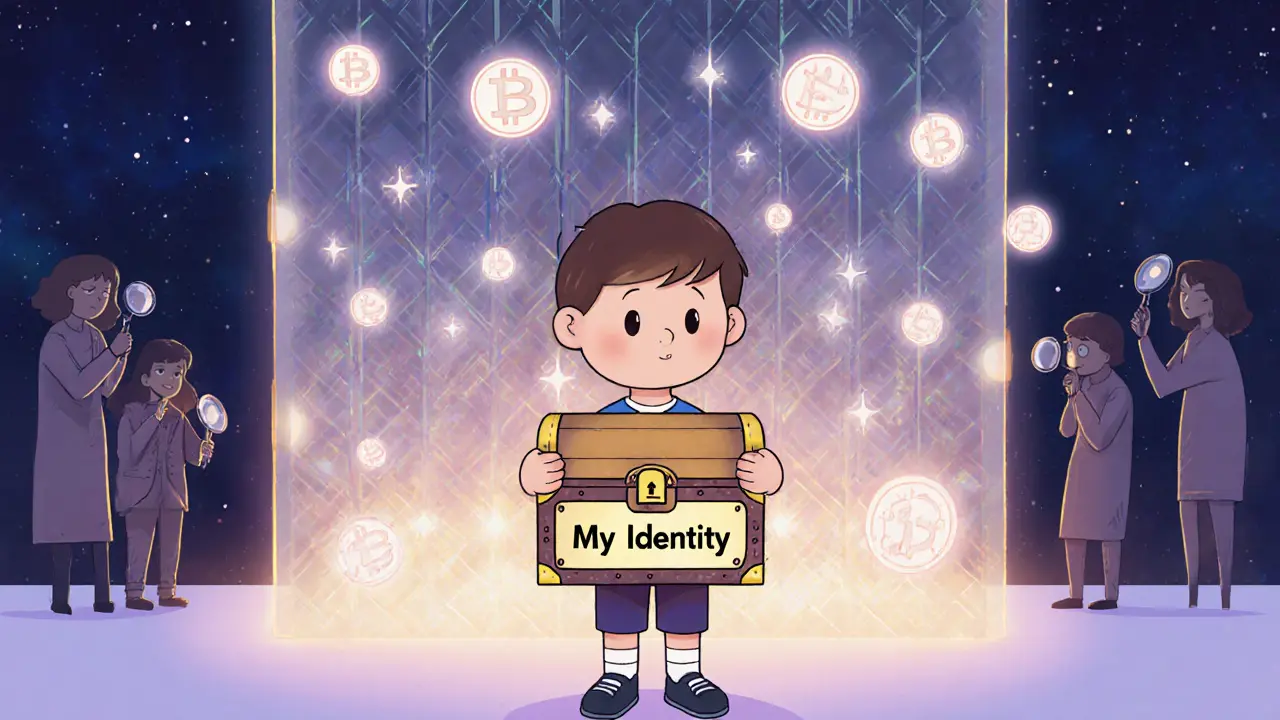Privacy Exposure Calculator
How Private is Your Digital Identity?
See how different identity verification methods affect your privacy exposure
Identity Verification Settings
Privacy Method
Privacy Exposure Analysis
Imagine showing your driver’s license, passport, and bank statement to every website you log into - just to prove you’re you. That’s how most online identities work today. Centralized companies store your data, and one breach can leak everything. Now picture this: you hold your identity in a digital token you control. No middleman. No database to hack. Just you, your wallet, and the power to decide what to share. That’s the promise of NFT-based digital identity. But here’s the catch - blockchains are public. Every transaction, every wallet link, every NFT you own is visible to anyone. So how do you keep your identity private when the system is built to show everything?
Why NFTs Are Not Built for Identity - At Least Not Yet
NFTs were never designed to be your ID card. They were made to prove you own a piece of digital art, a virtual land plot, or a rare sneaker. That’s why most experts say: NFTs are good for modeling what you own, but not for modeling who you are. The problem isn’t the tech itself - it’s the mismatch. Identity isn’t about ownership. It’s about attributes: your name, age, citizenship, education, credentials. These aren’t things you buy or trade. They’re facts about you. And when you put those facts on a public blockchain, you’re broadcasting them to the world.Take a standard ERC-721 NFT. Its metadata - the info about what it represents - is usually stored on a public server. If your NFT says “Verified Doctor, 2023,” anyone can see that. Worse, they can trace every wallet you’ve ever used, every NFT you’ve bought, every transaction you’ve made. Privacy isn’t just compromised - it’s erased by design.
Secret NFTs: Privacy Built Into the Token
There’s a new kind of NFT changing the game: Secret NFTs. Unlike regular NFTs, Secret NFTs don’t expose their metadata on-chain. Instead, they use encryption to keep ownership and details private - even from blockchain explorers. Only the person who holds the key can unlock the full data. This isn’t just a feature. It’s a revolution.Imagine holding an NFT that proves you’re a licensed nurse. On a regular NFT, that info is out there for anyone to scrape. With a Secret NFT, the proof exists only when you choose to reveal it. You could show it to a hospital’s hiring system, but not to a data broker or a scammer. Creators can even watermark public versions of their NFTs while keeping the high-res, verified version locked behind encryption. This turns NFTs from public trophies into private credentials.
Secret NFTs are built on networks like Secret Network, which use confidential computing to encrypt data at every stage - even during processing. That means your identity data never gets exposed, even when it’s being verified. It’s like having a locked briefcase that only opens when you give the right code. No one else sees what’s inside, not even the network.
Soulbound Tokens: Identity That Can’t Be Sold
Another breakthrough is the soulbound token (SBT). These are NFTs that can’t be transferred, sold, or traded. They’re permanently tied to your wallet - like a digital diploma, membership card, or vaccination record. Unlike regular NFTs, SBTs aren’t meant to be assets. They’re meant to be proof of who you are in a community.For example, you could earn an SBT for completing a cybersecurity course. That SBT stays with you forever. When you apply for a job, you can show it without revealing your entire transaction history. Employers get proof of skill. You keep your financial activity private. It’s a way to build reputation without exposing your wallet.
But there’s a flaw. Anyone can issue an SBT to you - even if you didn’t ask for it. A shady group could send you an SBT claiming you’re a member of a controversial organization. That’s why user consent is critical. Future SBT systems need permission gates: you approve who can issue you tokens, and you can revoke them if they’re misused.

Zero-Knowledge Proofs: Proving Without Revealing
The most powerful tool for privacy in NFT identity isn’t a new token - it’s a math trick. Zero-knowledge proofs (ZKPs) let you prove something is true without showing the thing itself. Think of it like this: You’re 25. You want to prove you’re over 21 to enter a bar. Instead of showing your ID, you use a ZKP to prove your birth date is before 2004 - without revealing your actual birth date.In NFT identity, ZKPs can verify your credentials without exposing them. You could prove you’re a citizen of Canada without showing your passport number. You could prove you passed a KYC check without revealing your name or address. This is how systems like zkSync and Polygon ID are building private identity layers on top of public blockchains.
ZKPs solve the biggest problem: transparency vs. privacy. You get the trust of blockchain verification - but none of the exposure. And unlike Secret NFTs, ZKPs work on any blockchain. That makes them the most scalable privacy solution yet.
Why Centralized Identity Still Wins - For Now
Let’s be honest: today, most people still use Google, Apple, or government IDs to log in. Why? Because they’re simple. You click “Sign in with Google,” and you’re in. No wallet setup. No gas fees. No risk of losing your private key.And centralized systems aren’t all bad. They’re regulated. They have customer support. They comply with GDPR. They let you delete your data. Blockchains don’t. Once you put your identity on-chain, it’s there forever. That’s a problem if you’re in the EU, where the “right to be forgotten” is law. You can’t erase a blockchain transaction. Even if you delete your NFT, the record of it still exists.
So NFT-based identity doesn’t replace traditional systems - it complements them. The future isn’t “blockchain or Google.” It’s “blockchain for control, Google for convenience.” Hybrid systems are already emerging: you use a centralized service to verify your identity, then lock that proof into a private NFT or SBT you control.

Real-World Use Cases That Work Today
Privacy-focused NFT identity isn’t theoretical. It’s being used now:- Healthcare access: Patients store vaccination records as Secret NFTs. Clinics verify them without seeing personal details.
- Event entry: Festival tickets are NFTs with private metadata. Only ticket holders can unlock entry codes - no scalpers, no fakes.
- Job verification: Employers check SBTs for certifications. No need to contact universities or request transcripts.
- Real estate: Property deeds are tokenized as NFTs. Buyers verify ownership without exposing seller identities.
These aren’t demos. They’re live systems running on Secret Network, Polygon, and Ethereum L2s. The tech works. The question is: will users adopt it?
The Big Hurdle: You Have to Understand It
The biggest barrier to privacy in NFT identity isn’t technology. It’s education. Most people don’t know what a wallet is. They don’t know how to back up a seed phrase. They don’t realize that losing access means losing their identity.And privacy isn’t just about hiding data - it’s about control. You have to understand what you’re sharing, why, and with whom. If you give someone a key to your private NFT, you can’t take it back. That’s a huge shift from Web2, where you just click “Accept” and move on.
Until users feel safe and confident, adoption will be slow. Wallets need better UX. Apps need clearer explanations. Governments need to recognize these tokens as legal proof. Until then, NFT identity remains a tool for early adopters - not the mainstream.
The Future: Privacy by Design
The next five years will decide if NFT-based identity survives. The winners won’t be the blockchains with the most transactions. They’ll be the ones that built privacy into their core.That means:
- More Secret NFTs and ZKP-based identity layers
- Standardized SBT issuance with user consent
- Regulatory frameworks that accept on-chain proof without forcing data exposure
- Wallets that auto-block spam SBTs and warn you before sharing private data
Privacy in NFT identity isn’t about making everything secret. It’s about giving you control. You should be able to prove you’re qualified without revealing your salary. You should be able to prove you’re a citizen without showing your home address. You should be able to prove you’re you - without handing over your entire digital life.
The technology is here. The question is: are we ready to take back our identity - one encrypted NFT at a time?

15 Comments
Dick Lane
October 29, 2025 AT 16:05 PMSo you're telling me I can prove I'm a doctor without showing my license? That's wild. I've been using Google to log into hospital portals for years. This feels like the future but also like a nightmare if I lose my seed phrase.
Chloe Jobson
October 31, 2025 AT 00:30 AMZKPs are the real MVP here. No data exposure, full verification. This is how you scale privacy without sacrificing trust. Secret NFTs are cool but ZKPs work on any chain. Game changer.
James Young
October 31, 2025 AT 06:44 AMStop pretending NFT identity is viable. You think some guy in Bangalore is going to understand wallet security? Most people can't even reset their password without calling support. This is tech bro fantasy wrapped in blockchain hype. You're not giving people control-you're giving them a gun they don't know how to load.
Elliott Algarin
November 2, 2025 AT 04:13 AMIt's not about the tech. It's about the shift in mindset. Web2 taught us to hand over our data for convenience. Web3 asks us to guard it like a treasure. That's a cultural leap, not a technical one. Most people aren't ready to be their own notary, librarian, and bank.
madhu belavadi
November 2, 2025 AT 14:37 PMWhy does this even matter? I just want to log in and watch cat videos. Why do I need to control my identity? Sounds like extra work for no reason.
John Murphy
November 4, 2025 AT 13:50 PMWhat happens when your SBT gets issued by mistake? Like someone sends you a token saying you're a convicted felon? Can you dispute it? Who's the arbiter? There's no customer service on the blockchain. That scares me more than any data leak.
Roxanne Maxwell
November 6, 2025 AT 13:00 PMI love the healthcare use case. Imagine being able to prove you got your boosters without handing over your entire medical history. That’s dignity. That’s respect. That’s what privacy should feel like.
Akinyemi Akindele Winner
November 8, 2025 AT 00:09 AMYou all are sipping crypto kool-aid while the world burns. NFTs for identity? Bro, in Nigeria we still fight to get a national ID card that doesn't get lost in a bureaucracy swamp. You're talking about encrypted digital diplomas while people can't even get their birth certificates. This ain't progress, it's privilege.
Michael Folorunsho
November 9, 2025 AT 22:09 PMLet me guess-you’re one of those people who think Europe’s GDPR is the gold standard. Sorry, but privacy isn’t about being afraid of exposure. It’s about being worthy of trust. If you need to hide your credentials, maybe you’re hiding something. Real men don’t need zero-knowledge proofs to prove they’re qualified.
Andrew Morgan
November 10, 2025 AT 01:44 AMImagine this: you walk into a job interview. You tap your phone. Boom. Your SBTs light up-degree, certs, past projects-all verified, none of your bank history, none of your dating app drama. That’s not sci-fi. That’s next year. This is the quiet revolution nobody’s talking about.
Norman Woo
November 11, 2025 AT 05:30 AMyou know what theyre not telling you right? secret nfts are just a front for the gov to track you better. theyll make you think its private but the keys are held by the feds. you think theyre gonna let you own your identity? lol. theyll just make it so you cant use it unless you give them backdoor access. its all a trap. i saw it on a reddit thread once. its real.
Zach Crandall
November 12, 2025 AT 05:33 AMWhile the technical merits of SBTs and ZKPs are compelling, one must consider the ontological implications of tokenizing identity. The reification of personhood into non-fungible assets risks commodifying the self, reducing existential authenticity to blockchain metadata. This is not innovation-it is epistemological colonization.
Jonathan Tanguay
November 13, 2025 AT 07:31 AMEveryone’s talking about ZKPs like they’re magic pixie dust but nobody’s talking about the gas fees for generating them on Ethereum. You think a nurse in rural Texas is going to pay $15 in gas to prove she’s licensed? And don’t even get me started on wallet recovery-if you lose your key, you’re not just locked out of your identity, you’re locked out of your life. And yeah I’ve been doing this since 2017 so I know what I’m talking about and you don’t. Also, Secret Network is way better than Polygon because they use TEEs not just encryption and you can’t even spell that right so you probably think NFTs are just JPEGs which they are not and also the EU’s right to be forgotten is a joke because blockchains are immutable and you can’t unring that bell so stop pretending this is easy. Also, why are we even using English for this? Shouldn’t we be using Rust or something? I’m serious.
Ayanda Ndoni
November 15, 2025 AT 02:26 AMBro I just want to know if my dentist has a license. Why do I need to understand ZKPs? Can’t we just have a website that says YES or NO? This is so overcomplicated. I don’t even know what a seed phrase is. I thought it was a type of pasta.
Patrick De Leon
November 16, 2025 AT 22:49 PMIrish identity is not for sale. We don't need blockchain tokens to prove we're Irish. We have passports. We have history. We have pride. This American tech fantasy won't work here. We don't need your encrypted credentials. We have our own ways. And they work.